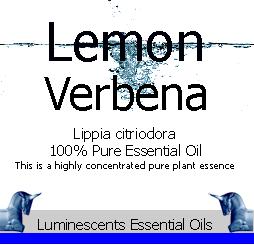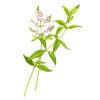Lemon verbena (Lippia citriodora) is a deciduous perennial shrub native to Peru, Argentina and Chile, and was brought to Europe by the Spanish in the 17th century. It grows to a height of 1 to 3 metres and exudes a powerful lemony scent. It prefers full sun, a lot of water, and a light loam soil, and is sensitive to cold. The light green leaves are lancet-shaped, and its tiny flowers bloom lavender or white in August or September.
Lemon verbena leaves are used to add a lemony flavour to fish and poultry dishes, vegetable marinades, salad dressings, jams, puddings, and beverages. It also is used to make herbal teas and can make a refreshing sorbet.
Lemon verbena is also classified as Verbena triphylla, Verbena citriodora , Lippia triphylla, Lippia citriodora, and Aloysia citriodora (Cav.) Ort.
CAUTIONS:
The essential oil is a delightful but dangerously phototoxic oil – use with caution on the skin even when diluted, as all essential oils should be, but it is perfectly safe in burners or vapourisers or as a linen water.
Traditional Attributes of Lemon Verbena Essential Oil:-
It is an uplifting, refreshing pick-me-up. Do not confuse with the herb Vervain (Verbena officinalis). Use for anxiety, cramps, indigestion, insomnia, liver congestion, nervous tension, stress related conditions. (Also known as Aloysia triphylla, Herb Louisa, Lippia citriodora, Lippia triphylla, Verbena, Verbena triphylla, Cymbopogon citratus.)
Lemon Verbena Essential Oil Blends Well With:-
Blends well with: Neroli, Palmarosa, Olibanum (frankincense), Lemon and other citrus oils.
History:-
Lemon Verbena was brought to Europe by Spanish explorers in the 17th century from Argentina and Chile. There it was grown for its fabulous lemony oil that was used in perfume and beverages until cheaper Lemon Grass oil replaced it. Aloysia triphylla is named after Maria Louisa the princess of Parma and wife of King Carlos IV King of Spain and that it has whorls of three (tri) leaves (phylla).






